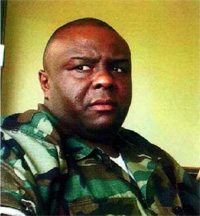By Björn Elberling
 As reported by the Court already on Saturday, there has been a first arrest concerning the Central-African Republic situation before the ICC. Jean-Pierre Bemba, leader of the "Movement for the Liberation of the Congo", former vice-president of the DR Congo transitional government and losing candidate in the 2006 presidential elections, has been arrested by Belgian authorities on the basis of an arrest warrant against him issued under seal on Friday. This warrant has now been made public – Bemba is charged with six counts of crimes against humanity and war crimes, particularly rape, torture and plunder, committed in the Central-African Republic. Court Press Release here, OTP Press Release here. The Hague Justice Portal reports on the case here. A date for Bemba’s transfer to the ICC does not seem to have been set yet. In the meantime, I’ll post some initial observations on the case/situation in the following days.
As reported by the Court already on Saturday, there has been a first arrest concerning the Central-African Republic situation before the ICC. Jean-Pierre Bemba, leader of the "Movement for the Liberation of the Congo", former vice-president of the DR Congo transitional government and losing candidate in the 2006 presidential elections, has been arrested by Belgian authorities on the basis of an arrest warrant against him issued under seal on Friday. This warrant has now been made public – Bemba is charged with six counts of crimes against humanity and war crimes, particularly rape, torture and plunder, committed in the Central-African Republic. Court Press Release here, OTP Press Release here. The Hague Justice Portal reports on the case here. A date for Bemba’s transfer to the ICC does not seem to have been set yet. In the meantime, I’ll post some initial observations on the case/situation in the following days.

All state parties to the Rome Statute are under the obligation of the RS (as a treaty) to cooperate with the Court. Obviously, the Court’s biggest problem (and one they are currently lamenting) is that the ICC itself has no power to execute its own arrest warrants. There are quite a few articles of the Rome Statute that set out issues of cooperation of state parties.
Art. 89 deals with surrender of persons to the Court, and art. 89(1) allows the Court to “transmit a request for the arrest & surrender of a person… to any State on the territory of which that person may be found and shall request the cooperation of that State in the arrest and surrender of such a person”. Clearly this indicates that the Court can request any state, whether party to the RS or not, to arrest & surrender a fugitive (as they have done with Sudan, which, not being a state party, has no obligation to execute the arrest warrant).
Art. 89(1) goes on to obligate state parties to comply with the requests for arrest and surrender. So if someone who is the subject of an ICC arrest warrant is within the territory of a state party, that state is obligated under the RS to arrest and surrender the person to the ICC. Exceptions to this obligation are in the circumstances of an ongoing investigation or prosecution of the person in question already being undertaken by the state (art. 94), or upon the analysis of the state party by a competing request for extradition by another state (art. 90). A state party may also postpone the request to arrest & surrender if there is an admissibility challenge before the Court (art. 95).
Hi Bjorn,
That’s interesting indeed. Can you say a bit more about the role of Belgium, both the legal and political dimension?
If I understand correctly, Belgium and the DRC were in some kind of a dispute recently, and this looks like Belgium is doing the present leader of the Congo a favor. After all, Bemba was the main rival of Kabila in the elections of 2006, and Bemba had some difficulty accepting his defeat.
As to the legal dimension. I was wondering if you could say something about the obligations for all states party to the ICC that flow from an arrest warrant.
It is an interesting case. Bemba clearly is not a little fish. He is a very big fish.